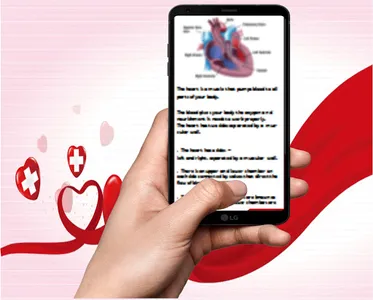Presenting Fight Heart disease apps! Where you can learn heart works and living with heart conditions. The warning sign of heart problem and knowing the risk of heart disease is the first step of avoiding from heart attack or stroke. The information of the Heart disease is Heart disease describes a range of conditions that affect the heart. Diseases under heart disease include blood vessel diseases, such as coronary artery disease is heart rhythm problems (arrhythmias); and heart defects you're born with (congenital heart defects), among others.
The term "heart disease" is often used interchangeably with the term "cardiovascular disease." Cardiovascular disease generally refers to conditions that involve narrowed or blocked blood vessels that can lead to a heart attack, chest pain (angina) or stroke. Other heart conditions, such as those that affect your heart's muscle, valves or rhythm, also are considered forms of heart disease.
Cardiovascular disease symptoms may be different for men and women. For instance, men are more likely to have chest pain; women are more likely to have other symptoms along with chest discomfort, such as shortness of breath, nausea and extreme fatigue.
Symptoms can include:
1. Chest pain, chest tightness, chest pressure and chest discomfort (angina)
2. Shortness of breath
3. Pain, numbness, weakness or coldness in your legs or arms if the blood vessels in
those parts of your body are narrowed
4. Pain in the neck, jaw, throat, upper abdomen or back
5. Chest pain, chest tightness, chest pressure and chest discomfort (angina)
6. Shortness of breath
7. Pain, numbness, weakness or coldness in your legs or arms if the blood vessels in
those parts of your body are narrowed
8. Pain in the neck, jaw, throat, upper abdomen or back
Risk factors
• Age. Aging increases your risk of damaged and narrowed arteries and weakened or
thickened heart muscle.
• Sex. Men are generally at greater risk of heart disease. However, women's risk
increases after menopause.
• Family history. A family history of heart disease increases your risk of coronary artery
disease, especially if a parent developed it at an early age
• Smoking. Nicotine constricts your blood vessels, and carbon monoxide can damage
their inner lining, making them more susceptible to atherosclerosis. Heart attacks are
more common in smokers than in nonsmokers.
• High blood pressure. Uncontrolled high blood pressure can result in hardening and
thickening of your arteries, narrowing the vessels through which blood flows.
• High blood cholesterol levels. High levels of cholesterol in your blood can increase the
risk of formation of plaques and atherosclerosis.
• Diabetes. Diabetes increases your risk of heart disease. Both conditions share similar
risk factors, such as obesity and high blood pressure.
• Obesity. Excess weight typically worsens other risk factors which diet that's high in
fat, salt, sugar and cholesterol can contribute to the development of heart disease.
• Physical inactivity. Lack of exercise also is associated with many forms of heart
disease and some of its other risk factors, as well.
• Stress. Unrelieved stress may damage your arteries and worsen other risk factors for
heart disease.
Complications
• Heart failure.
• Heart attack.
• Stroke.
• Aneurysm.
• Peripheral artery disease.
• Sudden cardiac arrest.
The term "heart disease" is often used interchangeably with the term "cardiovascular disease." Cardiovascular disease generally refers to conditions that involve narrowed or blocked blood vessels that can lead to a heart attack, chest pain (angina) or stroke. Other heart conditions, such as those that affect your heart's muscle, valves or rhythm, also are considered forms of heart disease.
Cardiovascular disease symptoms may be different for men and women. For instance, men are more likely to have chest pain; women are more likely to have other symptoms along with chest discomfort, such as shortness of breath, nausea and extreme fatigue.
Symptoms can include:
1. Chest pain, chest tightness, chest pressure and chest discomfort (angina)
2. Shortness of breath
3. Pain, numbness, weakness or coldness in your legs or arms if the blood vessels in
those parts of your body are narrowed
4. Pain in the neck, jaw, throat, upper abdomen or back
5. Chest pain, chest tightness, chest pressure and chest discomfort (angina)
6. Shortness of breath
7. Pain, numbness, weakness or coldness in your legs or arms if the blood vessels in
those parts of your body are narrowed
8. Pain in the neck, jaw, throat, upper abdomen or back
Risk factors
• Age. Aging increases your risk of damaged and narrowed arteries and weakened or
thickened heart muscle.
• Sex. Men are generally at greater risk of heart disease. However, women's risk
increases after menopause.
• Family history. A family history of heart disease increases your risk of coronary artery
disease, especially if a parent developed it at an early age
• Smoking. Nicotine constricts your blood vessels, and carbon monoxide can damage
their inner lining, making them more susceptible to atherosclerosis. Heart attacks are
more common in smokers than in nonsmokers.
• High blood pressure. Uncontrolled high blood pressure can result in hardening and
thickening of your arteries, narrowing the vessels through which blood flows.
• High blood cholesterol levels. High levels of cholesterol in your blood can increase the
risk of formation of plaques and atherosclerosis.
• Diabetes. Diabetes increases your risk of heart disease. Both conditions share similar
risk factors, such as obesity and high blood pressure.
• Obesity. Excess weight typically worsens other risk factors which diet that's high in
fat, salt, sugar and cholesterol can contribute to the development of heart disease.
• Physical inactivity. Lack of exercise also is associated with many forms of heart
disease and some of its other risk factors, as well.
• Stress. Unrelieved stress may damage your arteries and worsen other risk factors for
heart disease.
Complications
• Heart failure.
• Heart attack.
• Stroke.
• Aneurysm.
• Peripheral artery disease.
• Sudden cardiac arrest.
Show More






